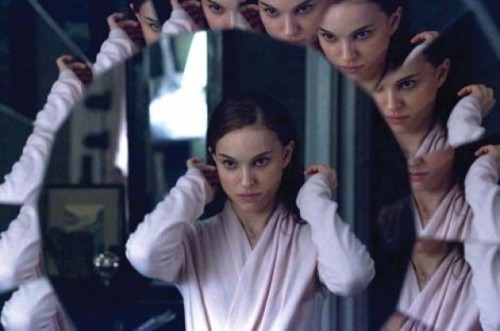Black Swan
Dance Macabre: Darren Aronofsky conjures up riveting psychodrama in Black Swan.
By Scott Renshaw @scottrenshawEver since he burst onto the independent film landscape in 1998 with his trippy Sundance entry Pi, Aronofsky has shown a fascination with representing what the world looks like to people who have fallen into madness and obsession. The addicts of Requiem for a Dream, the driven scientist in The Fountain and even the broken-down protagonist of The Wrestler all became opportunities for Aronofsky to experiment with sound and images to show viewers characters with a crumbling sense of reality. But with Black Swan, he commits to that concept so fully that it’s either a masterpiece, or a small slice of insanity in its own right.
His setup—working from a script by Mark Heyman, Andres Heinz and John McLaughlin—is deceptively simple. Nina Sayers (Natalie Portman), a young dancer in the corps of a New York City ballet company, enters the new season with a new opportunity. The company’s aging prima ballerina (Winona Ryder) is being shown the door, and the creative director, Thomas, (Vincent Cassel) is looking for a new star to play both the Swan Queen and the Black Swan in his upcoming production of Swan Lake. But is the prim, perfectionist Nina capable of playing the sensual Black Swan the way newcomer Lily (Mila Kunis) might be able to?
That’s the central psychological tension in the story, and Black Swan sets it up brilliantly. We see Nina still living with her controlling mother (Barbara Hershey)—herself a former dancer who never quite made the big time, thanks to conceiving Nina unplanned—in a bedroom piled with stuffed animals and decked out in girlish frills. We get glimpses of Nina’s bulimic purging, and references to a history of self-cutting. An early comment by Thomas makes a distinction between technical proficiency and passion, and Nina—driven by guilt that she has to achieve what her mother couldn’t when she chose Nina over her career—becomes a case study in what the pursuit of perfection can do to the soul.
It hardly takes a road map to find that subtext, but it’s what Aronofsky does with those ideas that makes Black Swan so enthralling. It starts simply enough, with Nina seeing doppelgangers of herself in a subway station and in the mirror. Then things start to get really creepy: bleeding around her fingernails, hallucinations (or are they?) of her toes beginning to fuse together. Nina starts to view her ability to play the Black Swan not as a role, but as something that requires a physical transformation—not unreasonable, given the demands made on dancers’ bodies. In a manner that’s halfway between black comedy and horror, Aronofsky concocts a reductio ad absurdum version of that famous anecdotal exchange between Laurence Olivier and Dustin Hoffman about the latter’s Method madness: “Dear boy, why not try acting?”
Portman certainly throws herself with abandon into this role, and it’s hard not to recognize the parallels between Nina and her own film career. As impressive as her young 1990s performances were in The Professional and Beautiful Girls, she hadn’t fully made the transition to mature woman on screen until now (yes, that includes her pole dancer in Closer). And that’s not just a function of her getting down and dirty with Kunis in one eyebrow-raising scene (though it certainly doesn’t hurt). Performances are too often lauded by how “difficult” they are, and entertainment-news reports have certainly made much of the grueling dance rehearsal time and dieting required for Portman to play Nina. But she’s terrific here not because of how hard she seems to be working, but because of how effortless she is at playing someone whose sense of self is falling apart.
There are bound to be viewers who find Black Swan too archetypal to be emotionally satisfying—or, for that matter, too just-plain-weird. Maybe that’s evidence that Aronofsky occasionally reaches for a macabre image when a subtler one would do. Or maybe that’s just further indication that Aronofsky has once again nailed the experience of prowling around inside someone else’s subconscious, seeing things you’d really prefer you hadn’t seen.
BLACK SWAN
Natalie Portman, Vincent Cassel, Mila Kunis
Rated R
|
Scott Renshaw
|
Speaking of...
-
ImprovBroadway
Looking in on Provo's latest improv comedy theater.
- Dec 12, 2016
-
Salt Lake Acting Company: Winter
A chat with the playwright and leading actress from the latest SLAC production.
- Oct 11, 2016
-
Beware Bad Wine!
- Jul 20, 2011
- More »
More by Scott Renshaw
-
Film Reviews: New Releases for April 12
Civil War, Escape from Germany, Coup de Chance, Hundreds of Beavers, La Chimera, Sting
- Apr 11, 2024
-
University of Utah School of Music premiere of A.L.I.C.E.
Composer connects the Lewis Carroll story to her experience living with autism
- Apr 10, 2024
-
Beavers and Spiders and Thieves, Oh My
Three new films cover a wide range of styles.
- Apr 10, 2024
- More »
Latest in Film Reviews
Readers also liked…
-
Power Plays
Two satirical comedies explore manipulations and self-delusions by those with power.
- Aug 31, 2022






